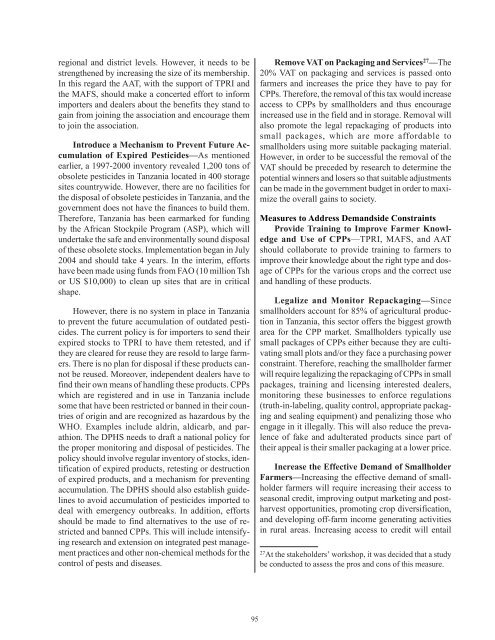An Action Plan for Developing Agricultural Input Markets in Tanzania
An Action Plan for Developing Agricultural Input Markets in Tanzania
An Action Plan for Developing Agricultural Input Markets in Tanzania
You also want an ePaper? Increase the reach of your titles
YUMPU automatically turns print PDFs into web optimized ePapers that Google loves.
egional and district levels. However, it needs to be<br />
strengthened by <strong>in</strong>creas<strong>in</strong>g the size of its membership.<br />
In this regard the AAT, with the support of TPRI and<br />
the MAFS, should make a concerted ef<strong>for</strong>t to <strong>in</strong><strong>for</strong>m<br />
importers and dealers about the benefits they stand to<br />
ga<strong>in</strong> from jo<strong>in</strong><strong>in</strong>g the association and encourage them<br />
to jo<strong>in</strong> the association.<br />
Introduce a Mechanism to Prevent Future Accumulation<br />
of Expired Pesticides—As mentioned<br />
earlier, a 1997-2000 <strong>in</strong>ventory revealed 1,200 tons of<br />
obsolete pesticides <strong>in</strong> <strong>Tanzania</strong> located <strong>in</strong> 400 storage<br />
sites countrywide. However, there are no facilities <strong>for</strong><br />
the disposal of obsolete pesticides <strong>in</strong> <strong>Tanzania</strong>, and the<br />
government does not have the f<strong>in</strong>ances to build them.<br />
There<strong>for</strong>e, <strong>Tanzania</strong> has been earmarked <strong>for</strong> fund<strong>in</strong>g<br />
by the African Stockpile Program (ASP), which will<br />
undertake the safe and environmentally sound disposal<br />
of these obsolete stocks. Implementation began <strong>in</strong> July<br />
2004 and should take 4 years. In the <strong>in</strong>terim, ef<strong>for</strong>ts<br />
have been made us<strong>in</strong>g funds from FAO (10 million Tsh<br />
or US $10,000) to clean up sites that are <strong>in</strong> critical<br />
shape.<br />
However, there is no system <strong>in</strong> place <strong>in</strong> <strong>Tanzania</strong><br />
to prevent the future accumulation of outdated pesticides.<br />
The current policy is <strong>for</strong> importers to send their<br />
expired stocks to TPRI to have them retested, and if<br />
they are cleared <strong>for</strong> reuse they are resold to large farmers.<br />
There is no plan <strong>for</strong> disposal if these products cannot<br />
be reused. Moreover, <strong>in</strong>dependent dealers have to<br />
f<strong>in</strong>d their own means of handl<strong>in</strong>g these products. CPPs<br />
which are registered and <strong>in</strong> use <strong>in</strong> <strong>Tanzania</strong> <strong>in</strong>clude<br />
some that have been restricted or banned <strong>in</strong> their countries<br />
of orig<strong>in</strong> and are recognized as hazardous by the<br />
WHO. Examples <strong>in</strong>clude aldr<strong>in</strong>, aldicarb, and parathion.<br />
The DPHS needs to draft a national policy <strong>for</strong><br />
the proper monitor<strong>in</strong>g and disposal of pesticides. The<br />
policy should <strong>in</strong>volve regular <strong>in</strong>ventory of stocks, identification<br />
of expired products, retest<strong>in</strong>g or destruction<br />
of expired products, and a mechanism <strong>for</strong> prevent<strong>in</strong>g<br />
accumulation. The DPHS should also establish guidel<strong>in</strong>es<br />
to avoid accumulation of pesticides imported to<br />
deal with emergency outbreaks. In addition, ef<strong>for</strong>ts<br />
should be made to f<strong>in</strong>d alternatives to the use of restricted<br />
and banned CPPs. This will <strong>in</strong>clude <strong>in</strong>tensify<strong>in</strong>g<br />
research and extension on <strong>in</strong>tegrated pest management<br />
practices and other non-chemical methods <strong>for</strong> the<br />
control of pests and diseases.<br />
95<br />
Remove VAT on Packag<strong>in</strong>g and Services 27 —The<br />
20% VAT on packag<strong>in</strong>g and services is passed onto<br />
farmers and <strong>in</strong>creases the price they have to pay <strong>for</strong><br />
CPPs. There<strong>for</strong>e, the removal of this tax would <strong>in</strong>crease<br />
access to CPPs by smallholders and thus encourage<br />
<strong>in</strong>creased use <strong>in</strong> the field and <strong>in</strong> storage. Removal will<br />
also promote the legal repackag<strong>in</strong>g of products <strong>in</strong>to<br />
small packages, which are more af<strong>for</strong>dable to<br />
smallholders us<strong>in</strong>g more suitable packag<strong>in</strong>g material.<br />
However, <strong>in</strong> order to be successful the removal of the<br />
VAT should be preceded by research to determ<strong>in</strong>e the<br />
potential w<strong>in</strong>ners and losers so that suitable adjustments<br />
can be made <strong>in</strong> the government budget <strong>in</strong> order to maximize<br />
the overall ga<strong>in</strong>s to society.<br />
Measures to Address Demandside Constra<strong>in</strong>ts<br />
Provide Tra<strong>in</strong><strong>in</strong>g to Improve Farmer Knowledge<br />
and Use of CPPs—TPRI, MAFS, and AAT<br />
should collaborate to provide tra<strong>in</strong><strong>in</strong>g to farmers to<br />
improve their knowledge about the right type and dosage<br />
of CPPs <strong>for</strong> the various crops and the correct use<br />
and handl<strong>in</strong>g of these products.<br />
Legalize and Monitor Repackag<strong>in</strong>g—S<strong>in</strong>ce<br />
smallholders account <strong>for</strong> 85% of agricultural production<br />
<strong>in</strong> <strong>Tanzania</strong>, this sector offers the biggest growth<br />
area <strong>for</strong> the CPP market. Smallholders typically use<br />
small packages of CPPs either because they are cultivat<strong>in</strong>g<br />
small plots and/or they face a purchas<strong>in</strong>g power<br />
constra<strong>in</strong>t. There<strong>for</strong>e, reach<strong>in</strong>g the smallholder farmer<br />
will require legaliz<strong>in</strong>g the repackag<strong>in</strong>g of CPPs <strong>in</strong> small<br />
packages, tra<strong>in</strong><strong>in</strong>g and licens<strong>in</strong>g <strong>in</strong>terested dealers,<br />
monitor<strong>in</strong>g these bus<strong>in</strong>esses to en<strong>for</strong>ce regulations<br />
(truth-<strong>in</strong>-label<strong>in</strong>g, quality control, appropriate packag<strong>in</strong>g<br />
and seal<strong>in</strong>g equipment) and penaliz<strong>in</strong>g those who<br />
engage <strong>in</strong> it illegally. This will also reduce the prevalence<br />
of fake and adulterated products s<strong>in</strong>ce part of<br />
their appeal is their smaller packag<strong>in</strong>g at a lower price.<br />
Increase the Effective Demand of Smallholder<br />
Farmers—Increas<strong>in</strong>g the effective demand of smallholder<br />
farmers will require <strong>in</strong>creas<strong>in</strong>g their access to<br />
seasonal credit, improv<strong>in</strong>g output market<strong>in</strong>g and postharvest<br />
opportunities, promot<strong>in</strong>g crop diversification,<br />
and develop<strong>in</strong>g off-farm <strong>in</strong>come generat<strong>in</strong>g activities<br />
<strong>in</strong> rural areas. Increas<strong>in</strong>g access to credit will entail<br />
27 At the stakeholders’ workshop, it was decided that a study<br />
be conducted to assess the pros and cons of this measure.

















